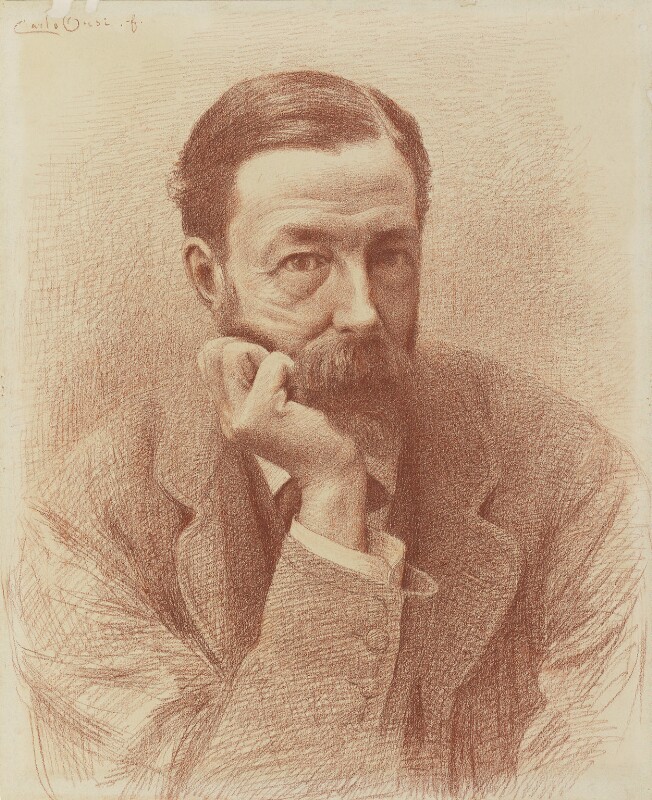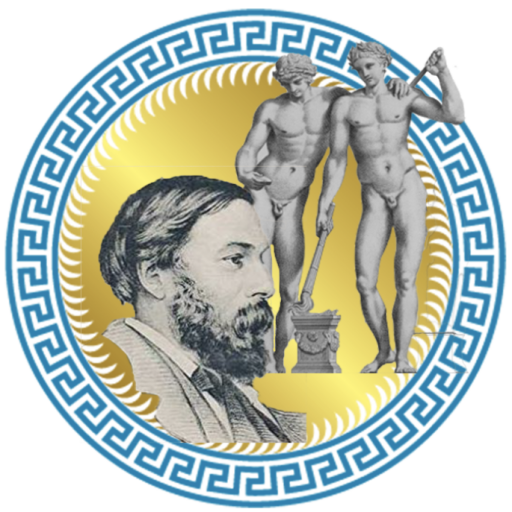It seems almost presumptuous for me to try and write a blog post on Symonds’ Studies of the Greek Poets. It’s a quite influential and momentous text that’s been discussed in detail by people far more erudite than I; additionally, and perhaps more pertinently, Yiyang has already written a wonderful overview and analysis of the text for this site’s blog (you should check it out).
I don’t want to retread ground that’s already been covered, so rather than focusing on the internal particulars of the work itself, I’m going to try and stick to examining some of the context within which Studies of the Greek Poets was written, and why I think it’s a pretty exciting work.
(I know, I get excited by old books about Greek poetry a lot. You should too!)

[I’ve finally written a blog post which warrants using an image of Symonds. I almost feel like a real academic now.]
As I mentioned in my last post, “Book it! (Part 1 – William Mure’s Critical History),” Symonds considered Studies to be a contribution to the then-relatively new scholarly movement of analyzing classical texts through a modern critical lens. Symonds was not content to merely present poetry as a historical document, or write a dry biography of classical writers. Rather, he aimed to provide an analysis which was both vividly evocative and packed with critical insight. Again, you should check out Yiyang’s post for a more in-depth look at how he accomplishes this.
Perhaps calling Studies of the Greek Poets a contribution to this critical movement is an understatement – it may seem a bit dramatic to phrase it this way, but I would consider Studies of the Greek Poets nothing short of revolutionary. Certainly, A Problem in Greek Ethics was a revolutionary text, and Symonds conceived of the two works collectively:
“Part of it [an essay on ‘Platonic Love’] I used for my chapter, in Studies of the Greek Poets, on the Greek Spirit. The rest I rewrote in Clifton in 1874, and privately printed under the title of A Problem in Greek Ethics.” – JAS, Memoirs, 340
This revolutionary thrust was not limited to some shared material between the two works, however. I believe that Symonds harbored a strong feeling of dissatisfaction with the state of the classical literary establishment during his lifetime, which likely inspired the creation of both A Problem in Greek Ethics and Studies of the Greek Poets.
Regarding the former, we may consider this excerpt from 1889 letter to Benjamin Jowett, which Symonds wrote in response to Jowett’s dismissal of the prospect of homosexual content in the works of Plato:
“It surprises me to find you, with your knowledge of Greek history, speaking of this in Plato as ‘mainly a figure of speech.’ […]
Greek love was for Plato no ‘figure of speech’, but a present poignant reality. Greek love is for modern students of Plato no ‘figure of speech’ and no anachronism, but a present poignant reality. The facts of Greek history and the facts of contemporary life demonstrate these propositions only too conclusively.
I will not trouble you again upon this topic. I could not, however, allow the following passage in your letter—‘I do not understand how, what is in the main a figure of speech should have so great power over them’—to go unnoticed without throwing what light I can upon what you do not understand.” – JAS, Memoirs, 154-155
I think this passionate rebuttal suggests not only Symonds’ interest in accurate discussion of homosexual love in ancient Greece, but also his resistance to academic ignorance or insufficient analysis.
Of course, there’s also a level of emotional intensity in Symonds’ writing here reflecting that his interest in discussing homosexuality in ancient Greece goes beyond simple academic exploration. Symonds’ personal experience doubtlessly both inspired and informed his work in this area. His remark that “Greek love is for modern students […] a present poignant reality” hearkens back to his personal observations of sexual contact within the student body at Harrow, which he derided as “repulsive” due to its manipulative and violent character (Memoirs, 148). A thread of personal experience runs through many of Symonds’ scholarly endeavors.
To return briefly to the topic of my last blog post, the sensuality and corruption Symonds witnessed at Harrow would have been constantly before him as he studied and contemplated his school gift copy of Mure’s Critical History – a connection made all the more prominent due to the text’s school bindings. One can only imagine what this association inspired for Symonds, and the role this inspiration played in the creation of A Problem in Greek Ethics.
For a look at material more directly related to Studies of the Greek Poets, let’s compare Symonds’ response to Jowett to this excerpt from a letter he wrote to George Smith in 1872, which I discussed in my last post.
“I have been often asked of late to reprint in a collected form some Essays on Greek Poetry […] In all of them it has been my aim to adjust the study of the Classics to the spirit of modern literary criticism more than has been attempted in the standard books on the subject – Müller and Mure.” – JAS, Letters, 254-255
This statement certainly lacks much of the fire present in the letter to Jowett, but it may be read as containing some similar motivation. Clearly, Symonds felt that existing critical work regarding classical literature was thin on the ground, and inadequate in the areas where it had been attempted.
While I will not claim that his modern poetic critical analysis was a topic which was personally important to Symonds to the same degree as his discussion of homosexuality in the classical world, I think that the recurring elements of sexuality and personal experience associated with his scholarly work in both areas – consider Mure’s Critical History, for just one example – suggests the source of the passion Symonds devoted to both A Problem in Greek Ethics and Studies of the Greek Poets. Furthermore, I believe that neither work could exist without Symonds’ desire to discard the restrictive shackles of entrenched traditions within classical scholarship, and to examine ancient works with fresh eyes.
Works Cited:
Symonds, John Addington.The Letters of Johns Addington Symonds. Wayne State University Press. Detroit, 1967. Print.
–. The Memoirs of John Addington Symonds: A Critical Edition. Amber K. Regis, ed. Palgrave Macmillan Publishing. London, 2016. Print.
–. Studies of the Greek Poets. London: Smith, Elder & Co., 1873

